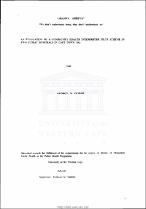| dc.description.abstract | This mini thesis describes the evaluation of the work of Community Health Interpreters (CHIs) in two Cape Town public hospitals, Its aim is to ascertain whether the introduction of interpreters in public hospitals led to an improvement in communication between health providers and their non-English and non-Afrikaans speaking Xhosa patients and whether this led to improved patient satisfaction, efficiency, improved quality of treatment and improved hospital accessibility. A number of test cases internationally has shown that the introduction of trained health interpreters within the hospital context improves communication between health providers and their patients leading to patient contentment. This qualitative study with a limited quantitative aspect was carried out to assess the perceptions of patients, health
professionals and health interpreters themselves about the work of the interpreters. One hundred (100) )Xhosa speaking patients and guardians were interviewed using an interview schedule, fifty (50) from Hospital A and fifty (50) from Hospital B. Fifty (50) health professionals were given self-administered questionnaires, twenty-five (25) were delivered in each hospital. Three (3) interpreters were interviewed at hospital A and two (2) interpreters were interviewed at hospitals using an interview schedule. The study measured: perceptions of knowledge of service, availability of interpreter service, faith in interpreters by patients, caring within the hospitals, participation by patients in management meetings of the health interpreters, proportion of clients -using the service, frequency of service use, education status, language and place of origin (Province) of patients who use the service, duration (in hours) of interpreting, number of days of work per week, education status, gender, age and language competency of the interpreters. Perceptions of doctors, nurses, social workers, managers have also been elicited about the work of the interpreters. | en_US |

